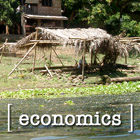
|
|||||||
|
GRAMEEN BANK, FOUNDER YUNUS WIN NOBEL PEACE PRIZE MICRO-CREDIT PIONEERS HONORED FOR WORK TO END POVERTY 13 October 2006 Muhammad Yunus, the Bangladeshi economist and entrepreneur who founded the Grameen Bank to give micro-credit loans to poor small-business owners, has won the Nobel Peace Prize. Yunus shares the prize with the bank he founded, the award given for the bank's efforts to help eradicate endemic poverty among large populations through individual financing. The Grameen Bank was founded over thirty years ago, with the specific goal of making business-oriented financing available to poor people who wanted to start or expand their businesses. The purpose was to stir development and help under-financed markets emerge through the dynamism and ingenuity of their own people, while keeping these vulnerable populations from exacerbating their poverty by falling under the sway of loan-sharks. The bank and its founder were honored for their efforts to "create economic and social development from below" through microcredit loans, often as small as US$50 in value, and with no collateral required. The Norwegian Nobel Committee's official citation adds: "Every single individual on earth has both the potential and the right to live a decent life. Across cultures and civilizations, Yunus and Grameen Bank have shown that even the poorest of the poor can work to bring about their own development". According to IBN, "The Grameen Bank is a microfinance organisation that provides credit to the poor in rural Bangladesh without any collateral. It was started when the village of Jobra in Bangladesh became the first area eligible for service from the bank in 1976." The cycle of economic deprivation and upward investment had kept a vast majority of Bangladeshis from having the opportunity to sustain even small informal sole-proprietorships providing basic services like food and clothing production or sale. With the ability to borrow without putting up meagre assets as collateral, poor individuals and villages have been able to fund their own responses to challenges of a harsh environment and under-developed economic region. Yunus was delighted by the news, but not only for his own achievement; he was, in his words, thinking of the benefit the prize will bring to the cause his bank represents. "It will give a significant amount of energy to the whole movement, I can guarantee you that ... this is just the beginning of it. ... You are endorsing a dream to achieve a poverty-free world," Yunus has said. It was during a famine in 1974 when Yunus first entered the mirco-credit arena, giving a loan of roughly US$27 to protect local villagers from predatory moneylenders. The Grameen Bank now counts among its accounts 6.5 million borrowers, using small infusions to provide or maintain basic development. 96% of the borrowers are women. [s]
|
||||||
|
|||||||

